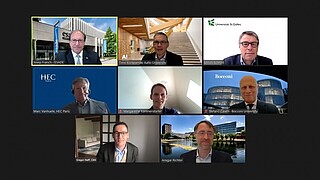Researchers, lecturers and experts in gender equality from various international universities and business schools met in Barcelona for the launch of EQUAL4EUROPE, a research project funded by the European Commission. Led by Esade, the project aims to identify and develop gender-equality plans for European research and higher education institutions to apply in their management strategies and diversity plans.
To achieve this goal, EQUAL4EUROPE has assembled a consortium of eight international partners made up of European researchers, academics and experts, including Erasmus University Rotterdam and PNO (the Netherlands), Comenius University de Bratislava (Slovakia), IEDC Bled School of Management (Slovenia), ESMT Berlin (Germany), INSEAD (France), EFMD (Belgium) and Esade (Spain). The consortium aims to identify and enable the levers that make it possible to mainstream gender in education and research, reduce gender imbalance in decision-making bodies and eliminate lingering barriers in the recruitment, retention and, especially, promotion of women.
According to Anna Ginès, coordinator of EQUAL4EUROPE and associate professor at Esade Law School ‘The higher the position at European universities and research centres, the fewer the women who hold it.’ ‘It is like a leaking pipeline’, she warned. ‘Women go from accounting for 47% of PhDs to 33% of researchers to 20% of full-time lecturers. With regard to management bodies, only one in five European institutions in the field are headed by women.’
“Closing the gender gap is crucial for widening the talent pool of universities,” comments Dr Joana Vassilopoulou, Project Lead, Erasmus University. “We will develop programmes, policies and measure to support our universities to harness the untapped female working potential.”
Academic expertise of leading international experts
The EQUAL4EUROPE consortium, which has received 3 million euros in funding, is part of the European Commission’s Horizon 2020 programme. Over the next four years, the project will pursue several lines of research, involving all levels of each institution, including students, faculty, researchers and general management. This will make it possible not only to diagnose and improve the situation, but also to raise awareness of gender equality within each group.
The project, coordinated by Esade, will also serve as a forum for sharing and disseminating knowledge and findings and will enable the creation of a European network of gender equality officers in which all the Union’s research and higher education institutions can share their experience with the practical implementation of the project’s plans and recommendations.


